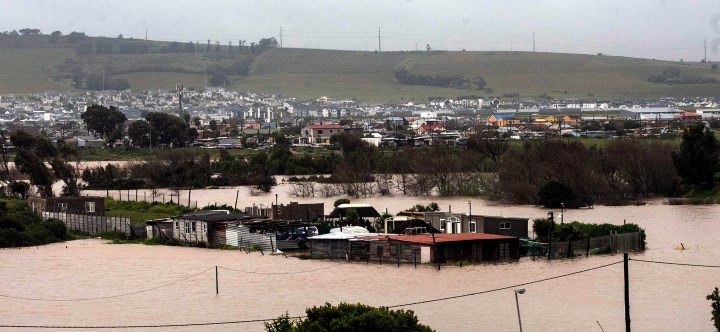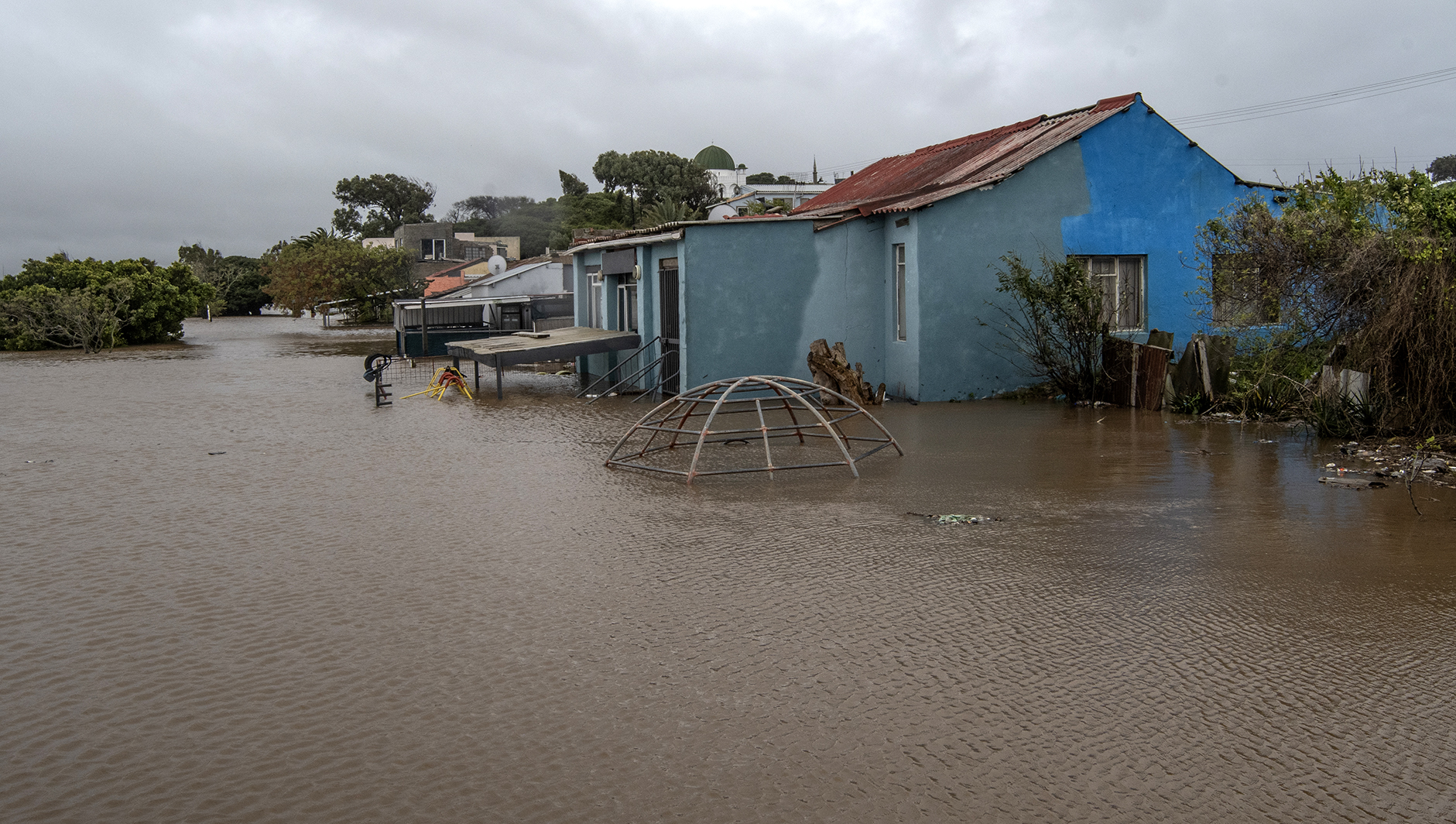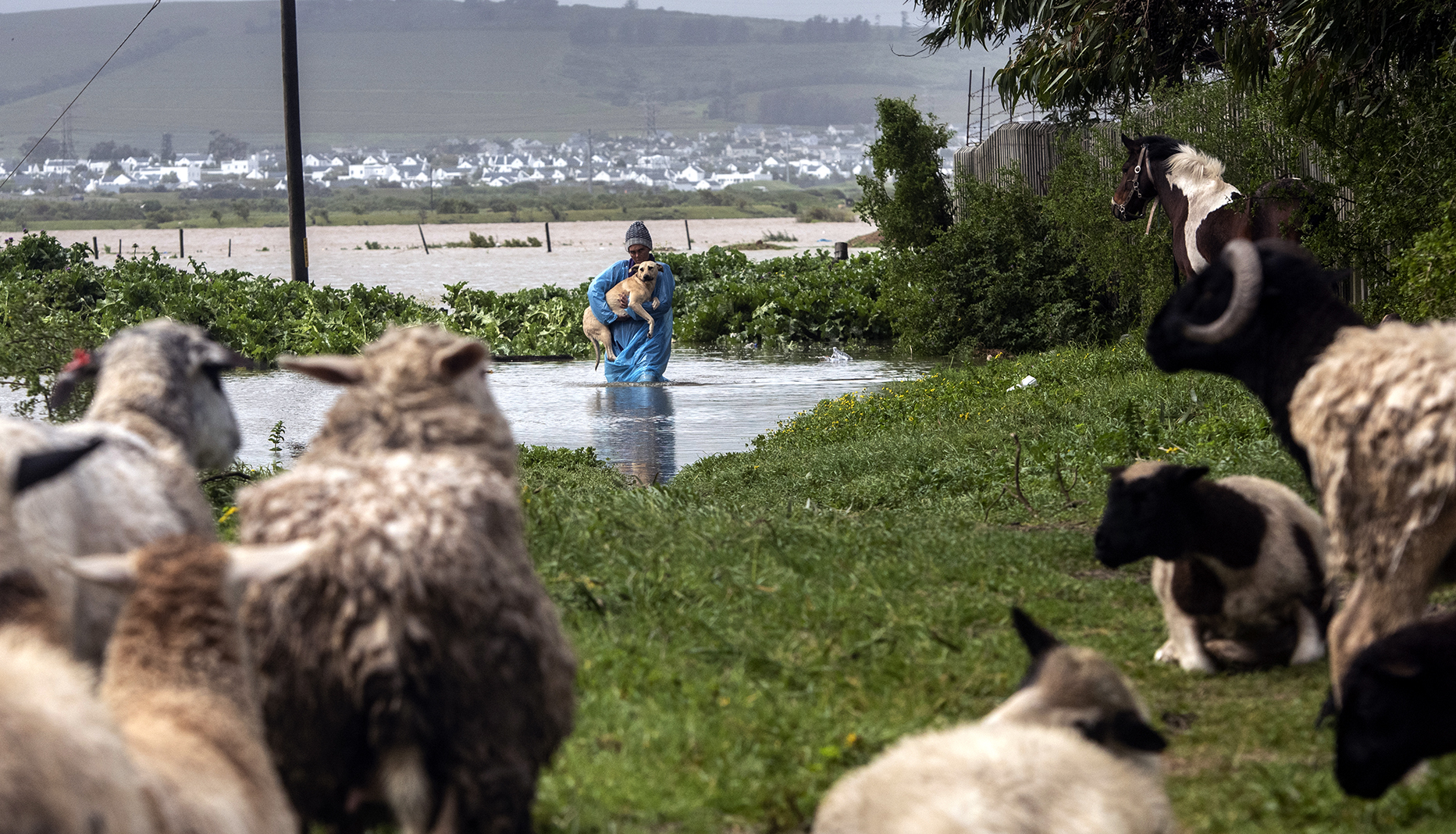CAPE OF STORMS
How prepared is Cape Town for a future of extreme weather events?

The City of Cape Town has a Climate Change Strategy and Winter Readiness Programme, but it will probably have to do more to prepare for future extreme weather events.
From the intense flooding in June to the massive coastal flooding two weeks ago, to the widespread flooding from the extreme storm at the weekend, the Mother City and larger Western Cape can’t seem to catch a break from extreme weather patterns.
These extreme weather and flood events are likely to occur more frequently in future. But is the City of Cape Town strengthening its preparedness to mitigate the potential loss of life, infrastructure collapse, displacement and agricultural impacts?

Flooded homes on 25 September 2023 in Sandvlei, Cape Town. (Photo: Benton Geach / Gallo Images)
Following this weekend’s torrential rains and floods, which claimed at least eight lives, the City of Cape Town explained to Daily Maverick the progress it has made in implementing its Climate Change Strategy. There is still much to do.
Expect more extreme weather
The SA Weather Service (Saws) chief scientist for climate service, Dr Andries Kruger, said the weekend storm could be classified as extreme and it was expected that extreme rainfall would become more common.
“The main reason why rainfall is becoming more extreme (and therefore extreme rainfall is becoming more common) is due to the warming of the atmosphere and oceans due to anthropogenic activities.
“Warmer oceans can cause enhanced development of rain-bearing systems over the oceans, to thus be more intense, while a warmer atmosphere increases the ability of the air to contain more moisture.
“The combined effect of these two factors will cause these systems to be more intense, with increased precipitation and probability of consequent flooding,” Kruger explained.
City of Cape Town’s plan
According to the City of Cape Town Climate Change Strategy, the city exists within a unique environmental context that makes it particularly vulnerable to several climate change-related challenges.
City spokesperson Luthando Tyhalibongo acknowledged that flood events may increase in the future due to climate change.
Over the past few years, the city has taken steps to strengthen its annual Winter Readiness Programme, which consists of interventions aimed at reducing vulnerability to flooding.

A woman carries her dog to safety on 25 September 2023 in Sandvlei, Cape Town. (Photo: Benton Geach / Gallo Images)
This mostly included large-scale cleaning and infrastructure maintenance of canals, catch-pits, sewer pipes and drains as well as a transversal public awareness and education programme.
During the heavy winter rains this past year, the Winter Readiness Task Team unblocked stormwater systems, diverted water from settlements into canals, distributed flood kits to affected communities, relocated families living in high-risk low-lying areas to higher ground, and provided humanitarian relief.
Tyhalibongo said much work went into the city’s preparedness for winter, and ensuring a coordinated response when extreme weather events did occur.
However, he said, “Very little can be done to avoid the impacts of an extreme event like the one Cape Town and many other parts of the country experienced this past weekend, and even the weekend before that.
“All that we can do is to ensure that whatever impacts are experienced, are dealt with as speedily as possible, and to minimise any risk to life and property.”
The City of Cape Town’s strategy acknowledges that the consequences of failing to adapt to and mitigate the effects of climate change will be significant and potentially severe.
“If steps are not taken to adapt to the predicted impacts of climate change and contribute to global efforts to mitigate climate change, there are a number of impacts that will be experienced with increasing intensity, severity and frequency, and a number of missed opportunities,” states the strategy.
According to the strategy, these impacts include:
- Drought and associated water shortages;
- Flooding and associated impacts on people and infrastructure;
- Heat stress and associated health impacts;
- Increased coastal erosion, mean sea level rise, stronger storm surges, and associated impacts on coastal infrastructure;
- Damage to infrastructure and property caused by severe storms and strong winds;
- Increased risk of fire, affecting the natural environment and urban areas;
- Loss of biodiversity and associated loss of ecosystem goods and services;
- Loss of agricultural productivity in the region and associated impacts on food security;
- Loss of jobs and livelihoods due to the impacts of climate change on key sectors; and
- Increased vulnerability to volatile oil prices and economic risks associated with investments in coal, fossil fuels and associated infrastructure that could see taxes or embargoes imposed on Cape Town’s goods and services by trade partners.
Concerning the severity of flooding and its related disastrous impacts, the Climate Change Strategy commits to “proactively reduce flood risk” by implementing a water-sensitive city strategy and taking action to reduce flood risk and storm damage through disaster mitigation approaches.
However, visible progress on achieving these goals is unclear, with the city’s spokesperson saying that progress was taking place on an ongoing basis.
“A key programme that supports the development of a water-sensitive city is the Liveable Urban Waterways Programme, which aims to rehabilitate and restore the city’s waterways to both reduce flood risk as well as to create safe and dignified recreational spaces.
“This programme forms a core part of the city’s approach to flood risk reduction through the use of green infrastructure, and is featured in both the Resilience Strategy (2019) and the Climate Change Action Plan (2021),” Tyhalibongo said.
This programme recently received support from the Cities Finance Facility, co-funded by GIZ and C40, to develop a business case for green infrastructure as a flood risk management tool.
The programme includes five projects in the Sand Catchment (Sand/Langevlei Canal, Grootboschkloof, Spaanschemat, Keyser and Westlake Rivers), the Vygekraal River corridor upgrade project and projects in Trafalgar Park (Woodstock) and at the Adderley Street fountain.
These projects are at the early stages of implementation, including conceptualisation, concept design and detailed design.
Tyhalibongo said a comprehensive stormwater master planning process had commenced, including revised flood-line determination, risk assessments and an assessment of the feasibility of developing early warning systems for flooding.
“This work will commence in 2023/24 as part of a longer-term eight- to 10-year process that will eventually cover all of the city’s catchments,” he said.
‘An expensive winter’
Stefaan Conradie, a PhD student in climatology at the Climate System Analysis Group at the University of Cape Town, explained that the type of cut-off low system seen over the weekend was much less frequent in September, which was usually a cool month with frequent light rain around Cape Town.
From the available data, it appeared to be the heaviest September precipitation event in Cape Town’s recorded history.
This was echoed during a Western Cape government briefing on Tuesday about its disaster response to the recent severe weather, a response which has shifted from saving lives to recovery and humanitarian aid coordination.
Local Government, Environmental Affairs and Development Planning MEC Anton Bredell said, “Although it is still too early to calculate the cost of this storm, if viewed in the context of the June floods, and the recent coastal damages due to storm surges, this is becoming a very expensive winter for the Western Cape.
“Moving forward, the focus must be to further invest in early warning infrastructure and to make sure that new infrastructure is designed with adjusted climate change parameters in mind.”
At the time of the disastrous June flooding, a team of expert climate modelling, adaptation and climate services researchers from the Agricultural Research Council and the Council for Scientific and Industrial Research spoke to Daily Maverick about the need to implement appropriate adaptation and resilience strategies as the impacts of climate change worsen
“The recent flooding events suggest a need for risk and vulnerability assessment research to inform scenario planning specifically looking at river channels, built infrastructure and land-use cases, eg, dams, settlement and farming landscapes to bolster adaptation actions in the face of flood extremes based on the best available climate model evidence,” they said.
They added that the mainstreaming of climate change in the revising of built-in infrastructure needed to be prioritised. Specifically, existing drainages and low-water bridges within urban areas needed to be evaluated for operation under the likely magnitude of floods and their climate change proofing and annual maintenance needed to be enhanced.
Bredell said the province had received a massive amount of rain, breaking records that had stood for anywhere between 28 years and 62 years, and that this event spoke to climate change and future challenges that the province will face. DM



















 Become an Insider
Become an Insider
“The main reason why rainfall is becoming more extreme (and therefore extreme rainfall is becoming more common) is due to the warming of the atmosphere and oceans due to anthropogenic activities.”
Not quite true. Our atmosphere is not warming up due to the activities of the ordinary people, if, indeed, it is warming at all. The lie that is perpetuated is that it’s all our fault – we, the great unwashed people. But in truth there are several factors that create devastating weather problems.
[see my next post]
I decline to comment.
4) Let’s stop burning fossil fuels, and putting up with people who support the oil-and-gas industry who – in Exxon’s case – knew about climate change FORTY YEARS AGO.